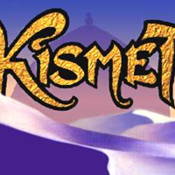
Overview
Synopsis
With extreme cleverness and a fair amount of luck, the poor but wily Poet rises from the streets of Baghdad, avoids losing a hand when put on trial for theft, and is instead given the title of Emir by the Wazir of Baghdad. Meanwhile, the Wazir is in debt and has taken out a loan with the King of Ababu. In return, he must now marry the Caliph to one of Abbabu’s princesses...or all three! This plan hits a snag when the Caliph falls in love with the Poet’s beautiful daughter, Marsinah, while traveling around the city incognito. He announces his plans to the Wazir, who is not best pleased and relies on the assistance of his new Emir. In a series of unfortunate circumstances, Marsinah is spotted within the Wazir’s harem and announced as his new bride to the devastated Caliph. Realizing what has occurred, the Poet tricks the Wazir into entering a pool of water where he is drowned. Caliph and Marsinah are reunited, the Poet is pardoned for the Wazir’s murder and, for his “punishment” he is rewarded with a life in luxurious exile with the Wazir’s beautiful widow, Lalume. Exotic, seductive, and Golden Age Broadway, these events could only happen on an Arabian Night!
Show Information
Context
Plot
Characters
| Name | Part Size | Gender | Vocal Part |
|---|---|---|---|
|
Lead |
Female |
Soprano |
|
|
Lead |
Female |
Soprano |
|
|
Lead |
Male |
Baritone |
|
|
Lead |
Male |
Tenor |
|
|
Lead |
Male |
Baritone |
|
|
Supporting |
Male |
Tenor, Baritone, Bass |
|
|
Supporting |
Male |
Tenor, Baritone, Bass |
|
|
Featured |
Male |
Tenor, Baritone, Bass, Bass-Baritone |
|
|
Ensemble |
Either Gender |
Soprano, Mezzo-Soprano, Alto, Tenor, Baritone, Bass, Bass-Baritone |
Songs
Act 1
- "Sands of Time" – Imam of the Mosque
- "Rhymes Have I" – Poet and Marsinah
- "Fate" – Poet
- "Bazaar of the Caravans"* – Ensemble
- "Not Since Nineveh"* – Lalume, Wazir, Ensemble
- "Baubles, Bangles and Beads" – Marsinah
- "Stranger in Paradise"* – Caliph and Marsinah
- "He's in Love!" – Caliph, Omar, Ensemble
- "Gesticulate" – Poet, Ensemble
- "Bored" – Lalume
- "Fate" (Reprise) – Poet and Female Ensemble
Act 2
- "Night of My Nights" – Caliph and Ensemble
- "Stranger in Paradise" (Reprise) – Marsinah
- "Baubles, Bangles, and Beads" (Reprise) – Caliph
- "He's in Love!" (Reprise) – Ensemble
- "Was I Wazir?" – Wazir, Ensemble
- "Rahadlakum"* – Poet , Lalume, Ensemble
- "And This Is My Beloved" – Marsinah, Caliph, Poet, Wazir
- "The Olive Tree" – Poet
- "Ceremonial of the Caliph's Diwan"* – Ensemble
- "Presentation of Princesses" – Ensemble
- "Finale" – Poet, Ensemble
A song with an asterisk (*) before the title indicates a dance number; a character listed in a song with an asterisk (*) by the character's name indicates that the character exclusively serves as a dancer in this song, which is sung by other characters.
Monologues
Scenes
Key Terms
Sorry! We do not currently have terms for this guide.
Videos
Quizzes
Themes, Symbols & Motifs
Sorry! We do not currently have learning modules for this guide.
Quote Analysis
Sorry! We do not currently have learning modules for this guide.
